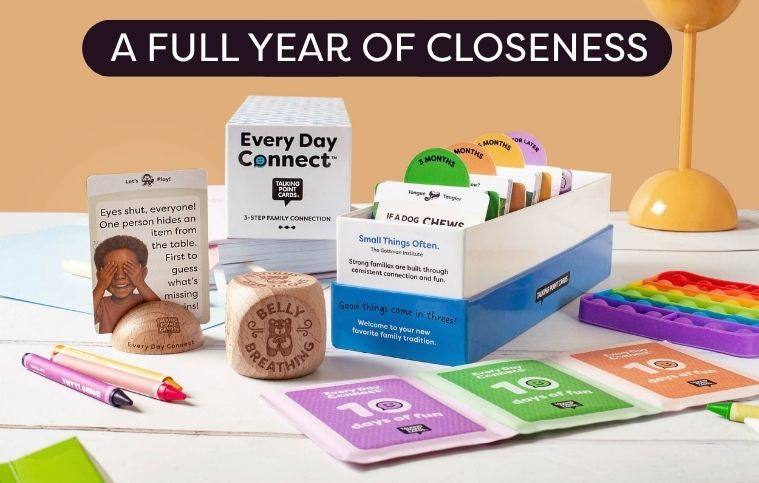SHOP
About
The Art of Conversation
How to Get a Meaningful Back-and-Forth Dialogue Happening

Ever notice how some people just seem to have a knack for getting others talking? They effortlessly draw you into engaging conversations that leave you feeling energized and connected. Meanwhile, the rest of us are left awkwardly fumbling through small talk about the weather and struggling to keep things going past "How are you?"
But here's the thing - great conversations aren't some mystical talent bestowed upon a lucky few. The ability to spark meaningful dialogue is a skill that can be learned and honed by anyone willing to put in a bit of effort. So let's dive into the art of conversation and explore how to get that back-and-forth flow happening.
Why Bother with Better Conversations?
Before we get into the how, let's talk about the why. In our hyper-connected yet somehow increasingly isolated world, the ability to connect through genuine conversation has never been more important.
Good communication skills are crucial in both our personal and professional lives. They help us:
-
Build stronger relationships
-
Advance our careers
-
Learn new things
-
Reduce misunderstandings and conflicts
-
Boost our mental health and well-being
Plus, let's be honest - life is just way more fun and interesting when you can get into those deep, rambling conversations that make time fly by.

1. Curiosity is Key
The foundation of any good conversation is genuine curiosity about the other person and what they have to say. This might seem obvious, but it's amazing how often we forget it in practice.
We get caught up in our own thoughts, waiting for our turn to speak instead of really listening. Or we ask questions just to be polite, without actually caring about the answers. But people can sense when you're not truly interested, and it kills the conversational vibe faster than you can say "Nice weather we're having, huh?"
So how do you cultivate real curiosity? Start by approaching each interaction with an open mind and a desire to learn something new. Remind yourself that every person you meet has a unique perspective and experiences to share. Even if you think you know everything about a topic, challenge yourself to find a new angle or insight.
The Building Blocks of Great Conversations

"I never learn anything talking. I only learn things when I ask questions."
- Lou Holtz
2. The Art of Asking Good Questions
Once you've got that curiosity mindset going, it's time to put it into action through thoughtful questions. Good questions are the fuel that keeps a conversation going. They show you're engaged and interested, and they give the other person a chance to share more about themselves or their ideas.
But not all questions are created equal. "Yes/no" questions tend to lead to dead ends, while open-ended questions invite elaboration and deeper discussion. Compare:
-
"Did you like the movie?" (closed)
-
"What did you think about the movie's ending?" (open)
The second question is much more likely to spark an interesting discussion about plot twists, character motivations, or broader themes.
Some other tips for asking great questions:
-
Use "what" and "how" questions to encourage descriptive answers
-
Ask about opinions and emotions, not just facts
-
Follow up on interesting points to show you're really listening
-
Avoid rapid-fire interrogations - let the conversation flow naturally

3. The Power of Active Listening
Alright, you've asked a great question. Now comes the hard part - actually listening to the answer. And I mean really listening, not just waiting for your turn to speak or mentally planning your next brilliant comment.
Active listening involves:
-
Giving your full attention to the speaker
-
Using nonverbal cues (eye contact, nodding, etc.) to show you're engaged
-
Resisting the urge to interrupt or immediately jump in with your own story
-
Reflecting back what you've heard to ensure understanding
It takes practice, but mastering active listening will dramatically improve the quality of your conversations. People will feel heard and understood, which makes them more likely to open up and share even more.
4. Finding Common Ground
Great conversations often happen when you discover shared interests or experiences with someone. It creates an instant connection and gives you plenty to talk about. But finding that common ground isn't always easy, especially with people who seem very different from you at first glance.
The key is to keep an open mind and look for unexpected connections. Maybe you don't share the same hobbies, but you both have a passion for learning new things. Or perhaps you come from totally different backgrounds, but you've both had similar challenges in your careers.

Some ways to uncover common ground:
-
Ask about passions and interests beyond the obvious
-
Share a bit about yourself to encourage reciprocation
-
Look for underlying values or motivations, not just surface-level similarities
-
Be willing to explore topics outside your usual comfort zone
5. The Importance of Give and Take
A good conversation is like a game of catch - both people need to participate for it to work. If one person is doing all the talking (or all the listening), it quickly becomes unbalanced and unsatisfying.
Aim for a rhythm of sharing and listening. After you've asked a question and listened to the response, offer your own thoughts or experiences related to the topic. This keeps the conversation flowing and helps build rapport.
But be careful not to dominate. If you find yourself talking for more than a minute or two without pausing, it's probably time to pass the ball back to your conversation partner.
Navigating Conversational Pitfalls
Even with the best intentions, conversations can sometimes go off the rails. Here are some common pitfalls to watch out for:

The One-Upper
We've all met this person. No matter what story you tell, they have a bigger, better, more dramatic version. It's tempting to fall into this trap, especially when we're trying to relate to someone. But it often comes across as competitive and self-centered.
Instead of trying to top their story, try saying something like "Wow, that reminds me of a similar experience I had..." This acknowledges their story while still allowing you to share your own perspective.
The Advice Giver
Sometimes people just want to vent or share an experience without getting a bunch of unsolicited advice. Unless someone specifically asks for your opinion on how to solve their problem, it's often better to offer empathy and understanding instead.
Try responses like "That sounds really challenging. How are you feeling about it?" or "I can see why that would be frustrating. What do you think you'll do next?"
The Conversation Hog
We all know that one person who can talk for hours about themselves without ever asking a single question about anyone else. Don't be that person. Make sure you're giving others a chance to contribute and showing genuine interest in what they have to say.
The Awkward Silence Filler
Silence can feel uncomfortable, but resist the urge to fill every pause with nervous chatter. A few moments of silence can actually be beneficial in conversation, giving both people a chance to gather their thoughts or shift to a new topic naturally.

Putting It All Together: Conversation in Action
So now that we've covered the building blocks of great conversations, let's see how it might play out in practice. Imagine you're at a party and you strike up a conversation with someone new:
You: "Hi there! I don't think we've met before. I'm [Your Name]."
Them: "Nice to meet you, I'm Alex."
You: "Great to meet you too, Alex! So how do you know the host?"
Alex: "Oh, we worked together a few years ago at a tech startup. How about you?"
You: "Interesting! I actually met them through a local hiking group. Speaking of tech startups, though, I'm curious - what was your role there? I've always been fascinated by that world but don't know much about it."
Alex: "I was a software developer. It was a crazy experience - long hours, lots of pressure, but also really exciting to be building something new."
You: "That sounds intense! What was the most challenging part for you?"
Alex: "Probably the constant uncertainty. We were always pivoting and changing direction, which made it hard to feel like we were making progress sometimes."
You: "I can imagine that would be frustrating. It reminds me a bit of a project I worked on in my field where the goalposts kept moving. How did you deal with that uncertainty?"
And so on... Notice how the conversation flows naturally from one topic to another, with a mix of questions and shared experiences. You're showing genuine interest in Alex's experiences while also contributing your own thoughts and finding points of connection.
The Never-Ending Journey of Conversation
Here's the thing about mastering the art of conversation - you're never really done learning. Every person you talk to is a new opportunity to practice and refine your skills. Some conversations will flow effortlessly, while others might feel like pulling teeth. And that's okay!

The key is to keep putting yourself out there, stay curious, and genuinely enjoy the process of connecting with others through dialogue. Over time, you'll find yourself having more and more of those energizing, time-flying conversations that make life richer and more interesting.
So next time you're tempted to stare at your phone to avoid small talk, challenge yourself to strike up a real conversation instead. You never know where it might lead - a new friendship, a brilliant idea, or just a moment of genuine human connection in our increasingly disconnected world
LIKED THIS ARTICLE?
SIGN UP FOR MORE!






